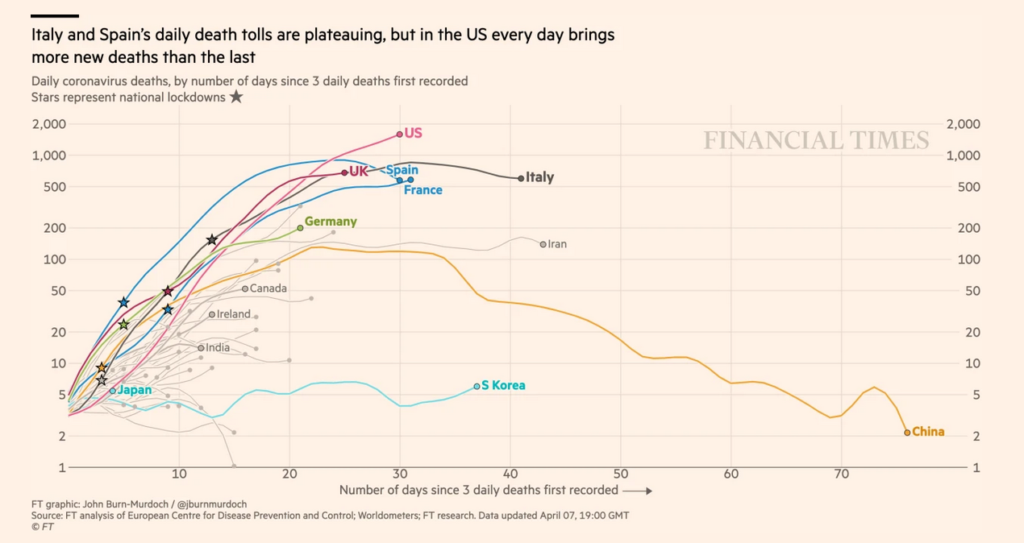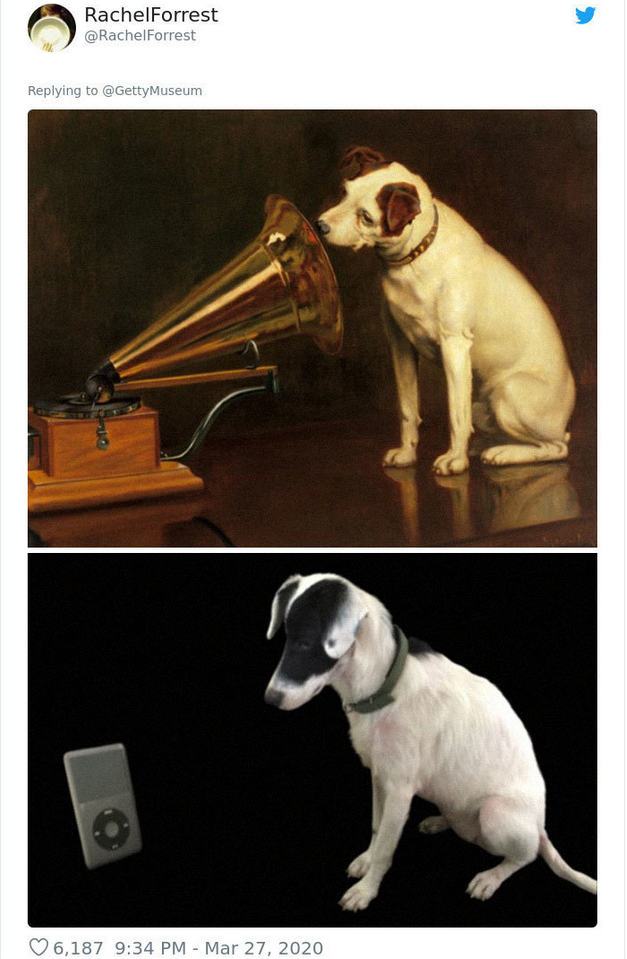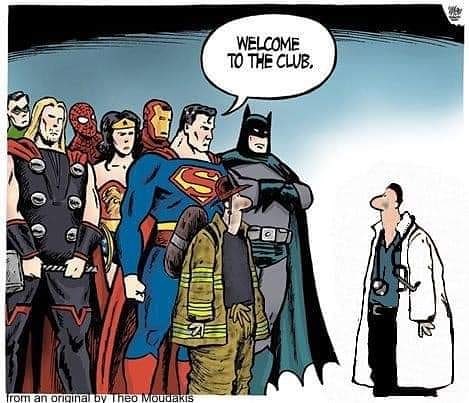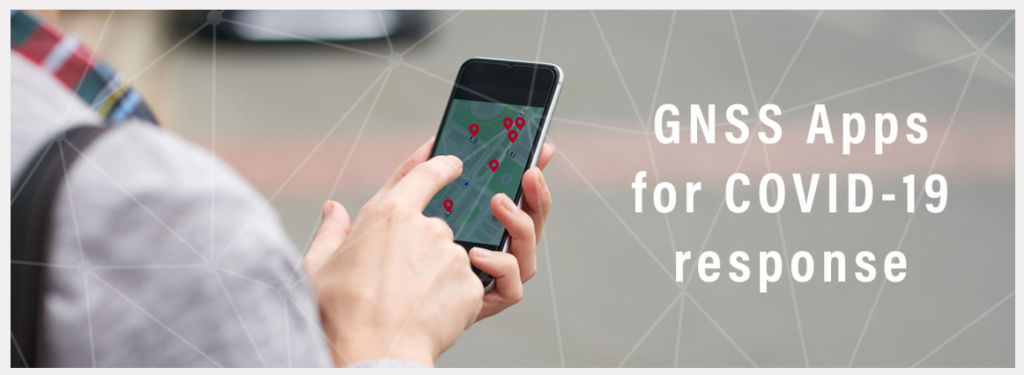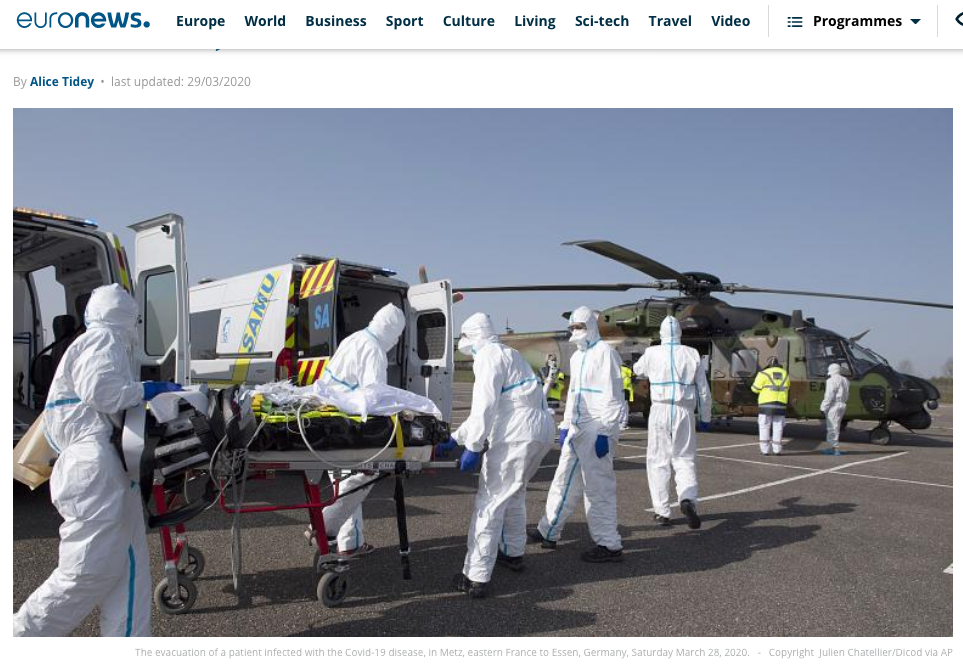Week 15, 2020
Turku, Finland
This is an honest question that I have: What kind of world do we want after covid-19?. In my opinion, all of us should reflect upon this question. We must invest quality time to think in our answer and make it a reality. This is a question that concerns each one of us: what do we want?
My “confinement” started on March 13, and I was not thinking about this question. As anyone else, I was not able to fully understand what was happening, or in which transformation journey we were starting to embrace. Then I saw the following image, which let me thinking:
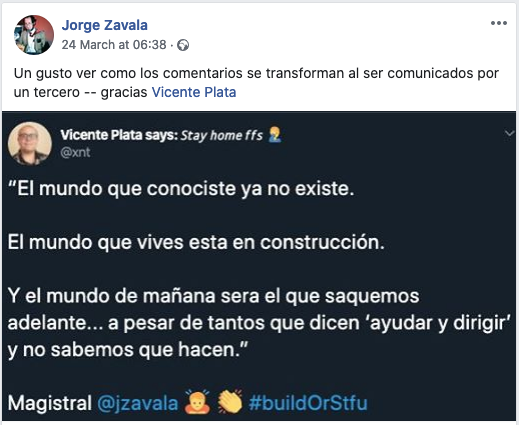
Facebook comment on Jorge Zavala wall. With an unprofessional translation it reads: “The world as we knew it, it does not exist. The world we are living is under construction. And tomorrow’s world will be the one we bring forward… despite many people who say ‘help and guide’ and we do not know what are they doing.”
Next, I wrote a couple of lengthy responses for different online discussions. One was focusing on building arguments against closing business. This discussion was lead by a US citizen. While the other conversation ponders about the response within the European Union (EU) lead by a Spanish professor. This conversations took place while the situation in Italy and Spain was getting worse in reference to the covid-19.
My inner is in distress, no only for the reality we are living an all the information we get from different channels. I am looking a meaningful conversation that will guide my own action. Maybe, I am looking a meta level type of conversation or I am looking to connect with the front lines. I do not know. To find the solution, I start to write. I know writing is not my strength, however while writing I am organizing my own ideas and start a personal process to find my own way to contribute. This post is a result of several days trying to write a message.
Let me locate my narrative in context. I am in a privileged situation. I live in Finland where mostly all is calm. At the same time I connect with people living in different regions of our globe. This includes friends living in European epicenters of covid-19, friends in countries addressing the pandemic quite successfully such as in South Korea, and family and friends in countries where the problems are piling up even before the covid-19 is in its full strength in their soil.
My work involves to promote innovation and support the growth in Finland. My passion is in informal learning, playful knowledge and co-design. However, the level of innovation we need at the moment goes beyond of what we have been practicing and researching until now. This is a real disruption. In order be able to move forward, we need to reflect beyond what it is evident and promote honest collaboration. To review our basics, our foundations to be able to build our world after covid-19.
HUMANS ARE VULNERABLE
Today, April 6th, there are recorded 70,567 deaths due to covid-19. We are aware that the total amount of people losing their lives due to covid-19 is greater than it is reflected by official numbers. This is happening all over the world because the tests for covid-19 are limited. Hence people are dying in their homes, or in hospitals recording the dead as “ atypical pneumonia”. This are facts, and if you can Italian I recommend you to follow information Italian websites, or even information in Spanish from Spain. Of course, talking with someone on a covid-19 epicenter will allow you to get access to the proper sources of information. To understand more about the tragedy, listen to people who is working at the hospitals, e.g. Bergamo or from Madrid the stories they can tell are shocking.
Not everybody can see this reality. We cannot see covid-19. Only “few” can feel it. Consequently, it is hard to believe the seriousness of the situation. We listen number of infected person, but we do not understand that each number is a person.
Are we living in a real-life dystopian world? I am sure no-one was planning to live something like this, so it is understandable that it is hard to believe or to understand. We believe humans are the “masters” of the world. We had all under “control”. Covid-19 is showing us, humans do not have the control.
Most of us, can only see and hear the information related to covid-19 from the communities that are paying the consequences of not taking social distancing seriously. This is only the introduction of the problem we are living.
WHY TO CLOSE BUSINESS AND PROMOTE SOCIAL DISTANCE?
It is important — for all of us — that our hospitals do not get saturated. If someone has to visit a hospital, for any type of emergency, independently of the covid-19, we want to assure there are the needed resources to be treated. We should act, all together, to take care of each other. In other words, everybody needs to help and contribute for the common good. Because covid-19 spreads as “wildfire”, we need to keep each one of us at home to avoid spreading it.
Is there another option to control the transmission of covid-19? Yes. We can learn from South Korea, Singapore and Taiwan. I can only talk about South Korea because I have lived there. In my experience, the country cares for all its population. You find rich and poor but also everybody, as far as I know, has the minimum: home and food. South Korea has a strategy in place to control epidemics in its territory, so they didn’t need to close all businesses.
To my eyes, the western world didn’t have an effective strategy in place, so we need to tackle the problem with another tactic, which is: social distancing and close businesses to enforce social distancing. Closing business implies to “slow down” the spread of covid-19 among us because we do not have a vaccine and the virus spreads with asymptomatic carriers. We cannot detect who those carriers are, so to protect everybody, each one of us should stay at home. Vox explains clearly how the virus spreads here:
Thus, the faster we close and develop a national strategy to “control” how covid-19 spreads, the faster we can resume activities. Let’s all work and help to achieve this! 🙂
ECONOMY
We cannot see the covid-19, in contrast we can feel and live the economical impact of closing business. Each one of us, with a different intensity, is living the economic consequences of “closing business”.
Closing most of the business, as soon as possible, has many consequences including social challenges. For this reason each country is writing its own story on how to handle covid-19.
Each decision a leader takes about how to address covid-19, has direct impact in the complex reality the leader’s country is living. Furthermore each nation has a unique composition of citizens, human capital, population density, levels of inequality, resources, human values, etc.
When governments take decisions for a common good, leaders must have a social conscience and need to be realistic. In the actual moment, this includes: (i) to protect vulnerable people from covid-19 and (ii) protect vulnerable people from shutting down business.
To protect vulnerable people from an economical perspective requires governments to activate mechanisms and means to support people to survive. That means people should have access to food and shelter. In addition it is needed to create a framework to support freelancers, entrepreneurs, SME and other industries.
If we do not take this measure, and we decide to go to work as normal despite the current covid-19 pandemic, assuming only “1%” of our population dies, and as Bill Gates mention, we can’t “ignore that pile of bodies over in the corner”
The fastest and effective way we close all business down, and “control” the spread of the virus, the faster we can re-open.
However this is more complicated than I am writing in here for many nations. Specially for countries with difficulties such as:
- high inequality in its population
- high numbers of homeless
- High levels of corruption
- High levels of insecurity
- Lack of basic infrastructure
- Lack of social mechanisms to support the population with food and basic services.
The toll that covid-19 will bring in terms of dead combine with the economic recession associated to it, in countries with any of the previously mentioned difficulties, has a considerable bigger challenge ahead of them in comparison to those countries with less “difficulties”. Note, I didn’t I include how “rich” a country is as one difficulty, because the difficulties enlisted do not depend sorely on “money”. The difficulties I mention are social problems connected to personal and social values.
WHAT ARE OUR PRIORITIES?
There are unspoken messages being shared questioning our priorities. Through social media, people is creating “memes” to question and expressing their thoughts about this. What are our priorities? Let me share some questions I had been collecting in these days:
(i) Shall we invest more in science?
There are nations which do not give value to scientific work. How can we expect development without research? Shouldn’t we invest more in preparing minds and promoting science at all ages?
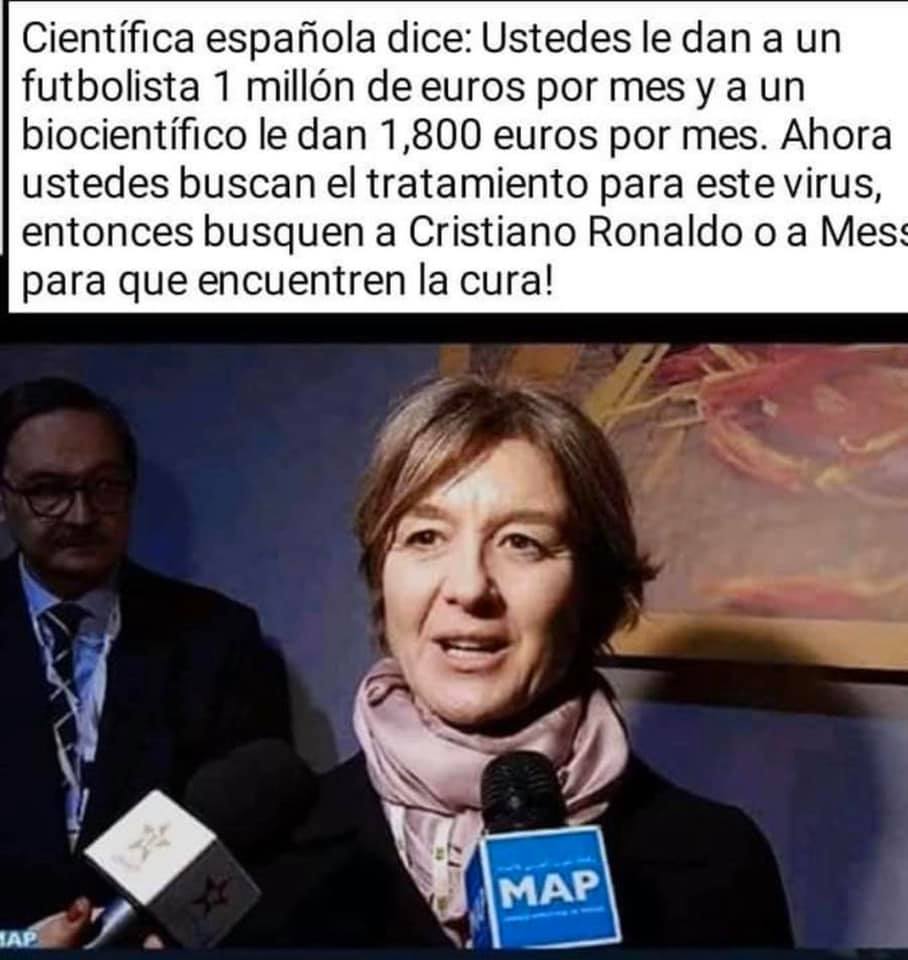
Meme circulating in internet questioning the correct pay to researchers. Unprofessional translation: Spanish researchers says: You pay 1,000,000 € per month to a football player, and to a bio-scientist you pay 1,800 € per month. Now you are looking for a treatment for this virus, then you can look to Cristiano Ronaldo or Messit to find the cure.
(ii) Shall we invest more in culture and art?
People working in cultural sectors are from the hardest hit economically at this moment. These professionals, in most cases, do not have an economical safe net because their main source of income are gigs. Today, culture and arts are the ones keeping us together, building hope about humanity. Here few examples:
- Italians defy coronavirust lock down by filling the streets with song. (March 13)
- Italians in nationwide coronavirus lockdown sing together to boos morale (March 15)
- Party in the middle of lockdown in Pont Aeri, Barcelona (Mar 18, 2020)
- Coronavirus: Germans sing Bella Ciao from rooftops in solidarity with Italy (March 21)
- Professionals such as the International Opera Choir with “Nabucco” (March 19):
- Professional classical players, e.g. Rotterdams Philharmonisch Orkest (March 20):
- Professional artists as in Spain the son “Resistiré” written by Carlos Toro, is the hymn of resistance against the virus: (video April 1st)
And many possibilities to visit museums virtually are constantly popping up. I will make a separate post about this. The importance of culture and art is undeniable.
(iii) Shall we always support, listen and care about our Doctors and Nurses?
As we all know, doctors, nurses and all the health caregivers are heroes in this historical moment and other times in history. As a friend from Madrid tole me in late March: take care of your sanitary personnel. We should always be aware of the importance of these professions in our society.
(iv) Shall we remunerate better farmers, supermarket clerks?
We give food for granted. Without farmers we would die of hunger. We should remember the importance of farmers, each one we eat our meals.
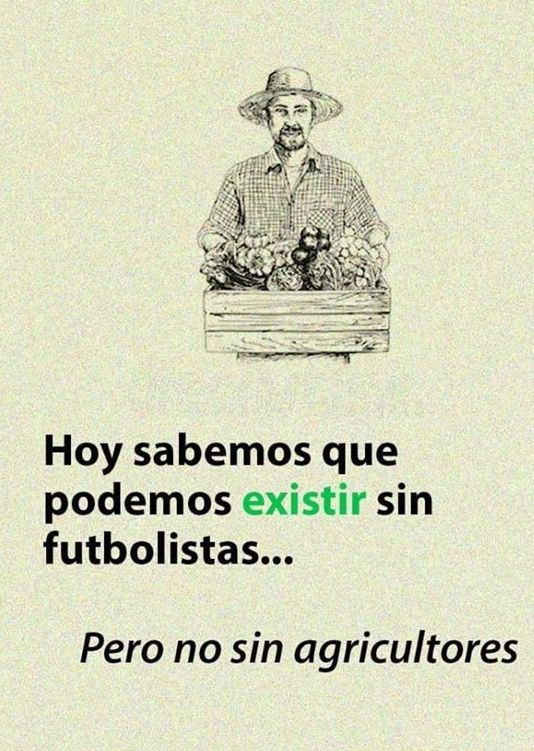
Meme, informal translation: Today we know that we can EXIST without soccer player…. but not without farmers
Additionally, we should thank all those clerks who keep stores organize for us.
(v) Recognize the importance of different trades and offer them proper salaries and benefits:
Policemen:
In Europe at least they really help to keep the community indoors and spread smiles, here some examples:
- Signing police for children in Algaida, Mallorca
- Policemen dancing “Baby Shark” in Andorra
- If you know Spanish, this policeman reading a letter from Pikachu for the children from his police car is priceless.
Couriers
Help us to connect physically. This video of UPS couriers cheering up themselves in Bergamo, an epicenter from Europe:
Drivers, maintenance workers and so many professions that allow us to have a life even in confinement. Other “less visible” but who are doing their best are teachers all over the world.
Each one of us is doing her and his best within the current circumstances. Each profession is important and each one of us contributes to our common well being. This is a lesson we should always remember.
Before the covid-19, we were in a race of automation. Today, in this stand still moment, the importance of machines in certain, and at the same time, it is evident the importance of the human factor.
The cooperation of all of us, knitted with our values allow us to overcome to disasters. Hence, wouldn’t be part of our priorities to encourage empathy, respect, care, promotion of ethical values? We are much more than the objects we produce. Each one of our actions, the ideas we transmit and creation we produce allow us to connect with others. This connection nurtures allowing the life to continue. It is by cooperating and collaborating.
THE REAL DANGER AND CURRENT DISRUPTION
Personally, I think the real danger is the strong presence of inequality in our world and the selfishness of some “leaders”. Countries with selfish “leaders”, which are careless and destroying the social fabric, eroding human values through corruption and totalitarianism are the main threat. The scary part is: these figures are raising up in power in this dark times.
Before the covid-19, I was reading the book Reality is broken. The book explains how digital technologies contribute o spread disinformation. This problem is accelerating today, in this crisis, and the results can be catastrophic. For example, I read complaints from Spanish colleges about the lack of European apps such as the one using in Korea to monitor covid-19. However, unless you are in the circle of GSA (European Glocal Navigation Satellite System Agency) , I haven’t seen about the efforts that Europe is taking in this direction:
GNSS is informing the population using the “traditional channels”, however the information does not spread as effectively as it should. What is the role that technology is taking here? (you should read the book!)
Another interesting example is the current and growing tension that European leaders are facing. The European Union, as a block, was not prepared for covid-19. That is a fact. However each country is doing its best with the resources and knowledge they have.
The EU is not perfect, but from my point of view, it is open to improve. Overall, EU has many good things as well. Sometimes I feel the voices highlighting the positive aspects are not strong enough. Positive and good things, apparently do not use “bots” algorithms to reproduce its message as “wild fire”. It is easier to criticize that is for sure. From my perspective, all the EU member states started their journey through covid-19, relatively at the same period. Some countries have been very badly hit than others. This is unquestionably.
However being able to help right away was also not easy. An analogy is in having a airplane crash. Remember what we are told each time we fly, in case of emergency: “oxygen masks will drop from the overhead area. Please place the mask over your own mouth and nose before assisting others”. This has a reason to be, if we do not put our mask first, then most likely, we will not be able to help anyone else. The same has been happening at EU level, each nation needed to put its own mask first before helping others. That means to sort out their own internal chaos in all their dimensions: health, unemployment, economy, etc. before committing with another nation.
Personally, I get excited when I read news such as Germany helping France and Italy with UCI beds, these beds are literally invaluable in this times.
Lately I read, that Europe is even including the UK in some reflections, which it is noticeable.
Yes, human should learn from this event, and we can do better. In my eyes I see Europe diverse, culturally rich and human.
When Spain showed the initiative: acortando la distancia, where patients could connect and talk with family members show that Europe cares about persons. European supermarkets have food, and people is not fighting for it. Only, in the first days, when people started to buy more than normal, in some places shelves were empty. I was never affected by this. However food has never been missing. There is respect for elders, and even for the dead. For example, at this moment it is not possible to do proper funerals, but the is some kind of funerals taking place, as this “drive through” in Spain. Europeans are showing that they care and can do things together.
Structural problems need to be addressed to avoid similar situations in the future. This implies to review investment in health and research by each member state, and understand how this can be improved to avoid the same mistakes. I am aware that some personalities will take this with a more pragmatic approach than others, while others might be more sensitive to the topic. We should remember that some member states are feeling more pain at the moment as well. However, I would like to say: Dear Europe, if we do not overcome this together, as Europe, then with whom do we want to join efforts? To be honest, this question is a real concern, and no thinking carefully the answer can deliver a very dangerous outcome. Let’s start reflecting upon this, and align our values while understanding the situation. Do not give anything for granted.
- What do we want as a society?
- How do we want to promote equality?
- How can we help in a macro-scale, while supporting the micro?
- What new economic models do we need to create? Our current economic system has been bomb (figurative talking) with covid-19.
This is time to reflect, to question and to understand how to create a better world after covid-19, because we are together in this.
Personally, I do not want to live under a totalitarian system. A system where critical voices will disappear. It is fundamental to protect our right to have different constructive opinions based in facts. Diversity is important. Totalitarian system implies to lose our real freedom.
Freedom is important for me, and I know freedom comes with responsibility. I would like a responsible society, where each person has an awareness of its role in the community and is able to respect oneself and others. This means, I reject “leaders” who promote divisions. “Leaders” who categorize people in groups to manipulate individuals with fear, bitterness and resentment. These “leaders” are not looking for a common good, a divisive agenda implies to benefit only some. These attitudes are putting us in danger. Real leaders address that each one of us is important.
Today´s disruption is in our political and economic systems. How do we want to continue forward? What values and visions will align ourselves in this new world? Interesting enough, innovation within the digital technology has an important role in the current political and economical disruption.
Each one of us has a great challenge ahead. From a freelancer to a multinational company. We need innovation more than never. We need innovation in a market that is unknown, and where the power regulators are changing. Our global model of consumption is changing. We knew, we should take care of our planet and harmonize our economical and productive systems accordingly. Covid-19 is an example on how vulnerable we are to natural phenomena. Do we want to push our “luck” and look for other natural disasters?
During this confinement or “waiting time”, innovators who have a clear head, can explore innovative ideas. There are so many dimensions we need help, besides finding a vaccine to protect us against covid-19. We need need to learn how to be productive at home, create new business, build inclusive economies, create a new direction…. I hope we are able to embrace this historical moment as the opportunity we needed to correct our direction.
We might get ideas, and valuable foundations when listening to real leaders. For this reason I close this post with an interview to Noam Chomsky. He is unquestionably, a thinker of our time, and we should hear what he says.
Listen, observe, think and do. We have much to do, and we have to go one step at the time.
We are in this together. Keep healthy!
— yop!
